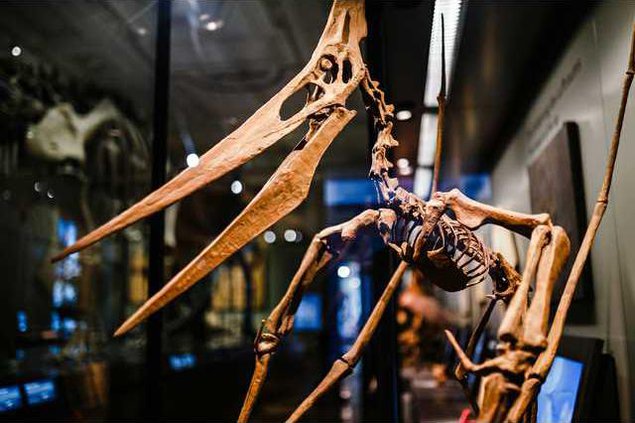Researchers have long wondered whether the Archaeopteryx dinosaur flew.
But now, thanks to X-ray imaging technology, the scientists have their answer, which they published in the journal Nature Communications on Tuesday: The bird could fly, just not in the way we all think.
As Science magazine reported, the feathery-winged dinosaur, which populated much of what is now Germany, is believed to be exhibit A in proving the evolution from dinosaur to modern-day birds. The dinosaur predated birds by 75 million years. But the debate continued to rage that just because Archaeopteryx had feathers doesnt mean it flew, the scientists said.
Scientists struggled to figure out whether or not the dinosaur could fly because flight motion itself does not fossilize, and the flight pattern of Archaeopteryx cannot be studied in a living animal anymore, which makes determining flight style even more difficult, according to CNN.
But lead study author Dennis Voeten wrote in an email to CNN that recent X-rays of the fossils revealed more about the dinosaurs arm bones.
"It was surprising to see that the wing bone geometry of Archaeopteryx looks remarkably more like those of modern birds than expected. The variation within modern flying birds is much larger than the differences between Archaeopteryx and the short-flying birds in our data set," Voeten said. "Although the anatomy of Archaeopteryx was incapable of executing the flight stroke of modern birds, this similarity accounts for the strongest evidence for active flight in this animal presented in 150 years of research."
The research paper didnt explain the birds specific flight pattern. However, Voeten told CNN that the bird probably moved similarly to a butterfly.
The dinosaur likely could fly to evade predators and move short distances.
"We imagine something like pheasants and quails," Voeten told BBC News. "If they have to fly to evade a predator they will make a very quick ascent, typically followed by a very short horizontal flight and then they make a running escape afterwards."
The researchers said that the dinosaurs movement is a sign that dinosaurs who lived in the Germany area at the time probably tried different modes of flying.
"We know that the region around Solnhofen in southeastern Germany was a tropical archipelago, and such an environment appears highly suitable for island hopping or escape flight," Martin Rper, Archaeopteryx curator and co-researcher of the report, told BBC News.
It probably wasnt the most efficient flier, according to New Atlas, but was a major step forward in dinosaurs evolving into birds.
But now, thanks to X-ray imaging technology, the scientists have their answer, which they published in the journal Nature Communications on Tuesday: The bird could fly, just not in the way we all think.
As Science magazine reported, the feathery-winged dinosaur, which populated much of what is now Germany, is believed to be exhibit A in proving the evolution from dinosaur to modern-day birds. The dinosaur predated birds by 75 million years. But the debate continued to rage that just because Archaeopteryx had feathers doesnt mean it flew, the scientists said.
Scientists struggled to figure out whether or not the dinosaur could fly because flight motion itself does not fossilize, and the flight pattern of Archaeopteryx cannot be studied in a living animal anymore, which makes determining flight style even more difficult, according to CNN.
But lead study author Dennis Voeten wrote in an email to CNN that recent X-rays of the fossils revealed more about the dinosaurs arm bones.
"It was surprising to see that the wing bone geometry of Archaeopteryx looks remarkably more like those of modern birds than expected. The variation within modern flying birds is much larger than the differences between Archaeopteryx and the short-flying birds in our data set," Voeten said. "Although the anatomy of Archaeopteryx was incapable of executing the flight stroke of modern birds, this similarity accounts for the strongest evidence for active flight in this animal presented in 150 years of research."
The research paper didnt explain the birds specific flight pattern. However, Voeten told CNN that the bird probably moved similarly to a butterfly.
The dinosaur likely could fly to evade predators and move short distances.
"We imagine something like pheasants and quails," Voeten told BBC News. "If they have to fly to evade a predator they will make a very quick ascent, typically followed by a very short horizontal flight and then they make a running escape afterwards."
The researchers said that the dinosaurs movement is a sign that dinosaurs who lived in the Germany area at the time probably tried different modes of flying.
"We know that the region around Solnhofen in southeastern Germany was a tropical archipelago, and such an environment appears highly suitable for island hopping or escape flight," Martin Rper, Archaeopteryx curator and co-researcher of the report, told BBC News.
It probably wasnt the most efficient flier, according to New Atlas, but was a major step forward in dinosaurs evolving into birds.



